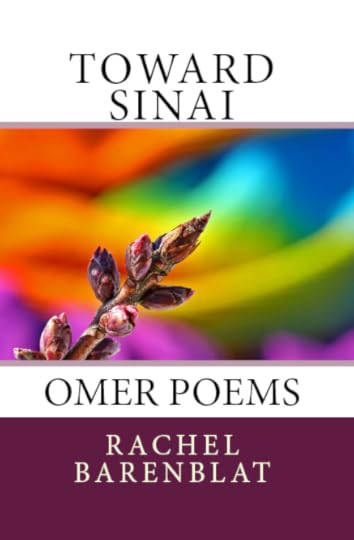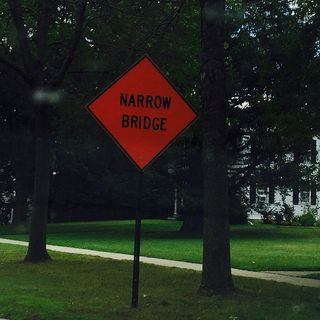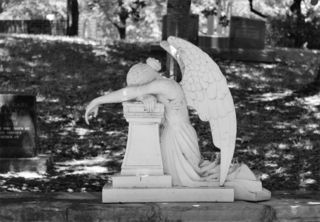Rachel Barenblat's Blog, page 112
December 9, 2015
Announcing Toward Sinai: Omer Poems
About a year ago, I had an audacious thought. I frequently aim to write daily poems during April, National Poetry Month in the United States. Over the last few years I've written daily poems during Elul (some of which are now collected as See Me: Elul Poems.) What if I could combine daily writing discipline with spiritual practice again and share 49 daily poems during the counting of the Omer?
As regular readers of this blog know (at least, those of you who were reading regularly last spring!), I came home from last year's OHALAH conference fired-up and inspired, and my level of poetic output surged. I did post 49 Omer poems here during the days between Pesach and Shavuot. I am delighted now to be able to share my collection of 49 Omer poems -- revised and improved for print -- with you.
 The Omer is the period of 49 days between Pesach (Passover) and Shavuot. Through counting the Omer, we link liberation with revelation. Once we counted the days between the Pesach barley offering and the Shavuot wheat offering at the Temple in Jerusalem. Now as we count the days we prepare an internal harvest of reflection, discernment, and readiness. Kabbalistic (mystical) and Mussar (personal refinement) traditions offer lenses through which we can examine ourselves as we prepare ourselves to receive Torah anew at Shavuot. Here are 49 poems, one for each day of the Omer, accompanied by helpful Omer-counting materials. Use these poems to deepen your own practice as we move together through this seven-week corridor of holy time.
The Omer is the period of 49 days between Pesach (Passover) and Shavuot. Through counting the Omer, we link liberation with revelation. Once we counted the days between the Pesach barley offering and the Shavuot wheat offering at the Temple in Jerusalem. Now as we count the days we prepare an internal harvest of reflection, discernment, and readiness. Kabbalistic (mystical) and Mussar (personal refinement) traditions offer lenses through which we can examine ourselves as we prepare ourselves to receive Torah anew at Shavuot. Here are 49 poems, one for each day of the Omer, accompanied by helpful Omer-counting materials. Use these poems to deepen your own practice as we move together through this seven-week corridor of holy time.
Praise for Toward Sinai: Omer Poems
Rachel Barenblat has gifted her readers with a set of insightful poems to accompany our journey through the wilderness during the Counting of the Omer. Deft of image and reference, engaging and provocative, meditative and surprising, this collection is like a small purse of jewels. Each sparkling gem can support and enlighten readers on their paths toward psycho-spiritual Truth.
--Rabbi Min Kantrowitz, author of Counting the Omer: A Kabbalistic Meditation Guide
Rachel Barenblat comes bearing a rich harvest. In Toward Sinai, her series of poems to be read daily during the counting of the Omer, a poem chronicles every step between Exodus and Sinai. The poems exist in the voices of the ancient Hebrews measuring grain each day between Passover and Shavuot, and also in a contemporary voice that explores the meaning of the Omer in our own day. Together, the poems constitute a layered journey that integrates mysticism, nature, and personal growth. As Barenblat writes: “Gratitude, quantified.”
--Rabbi Jill Hammer, author of The Omer Calendar of Biblical Women
Your Torah is transcendent and hits home every time.
-- Rabbi Michael Bernstein, Rabbi Without Borders Fellow
Toward Sinai: Omer poems $12 on Amazon
Those who will be attending the OHALAH conference next week will have an opportunity to pick up copies of this new collection at the shuk -- and I'll gladly inscribe them for you or for the recipient of your choice! Deep thanks to all of my readers, especially to Rabbi Michael Bernstein, Rabbi Jill Hammer, and Rabbi Min Kantrowitz who graciously offered reflections on the book before print.

December 8, 2015
Aleph Bass
The folks behind Darshan just put out a new single, with a stunning psychdelic animated video:
(If you can't see the embedded video, you can go directly to it at YouTube.)
I wrote my undergraduate thesis on the Sefer Yetzirah and the Jewish mystical idea that because creation is ultimately made up of Hebrew letters, we can use meditative linguistic techniques to un-do language and ascend to union with God. This track draws on those kinds of teachings, so it was guaranteed to be up my alley -- even before the beautiful animation which moves from Middle Eastern cityscapes to the furthest reaches of outer space.
The English words are on the track's YouTube page, and I'll share them here also:
Letters are the building blocks of all of God's creation
Kabbalistic keys unlock the heart of human nature
Metaphysic molecules of mystic nomenclature
Torah is the Tree of Life in musical notation
Speaking into being, existential occupation
For servants of the Source of Light and Root of Revelation
Reading into meaning, covenantal calibration
For students on the path of learning language liberation
The Hebrew words (when they're not a recitation of the letters of the aleph-bet) come from an alphabetical acrostic of praise recited on weekdays as part of the Yotzer Or blessing, the blessing for God Who creates light. (If you can read Hebrew, you'll find the words at the top of this blog post.) It's a neat interweaving of classical text and contemporary form.
Anyway, enjoy the song on YouTube. (And I believe it's available on iTunes, Spotify, Amazon, etc, for those who are so inclined.) Happy Chanukah!

December 7, 2015
Worth reading on Chanukah this year
Those who follow me on Facebook may already have seen these links, but I wanted to share them here as well -- two of my favorite new posts on Chanukah this year, both written by dear friends, fellow ALEPHniks, and fellow Rabbis Without Borders.
First is a post by Rabbi Hannah Dresner:
...Eternal light in the Temple symbolized an uninterrupted connection between God and Israel. The Temple’s desecration ruptured that connection but when the menorah was rekindled with the tiniest amount of remaining oil, the Temple light did not go out! This miracle was an event of great comfort within the Maccabee narrative, and is, to us, in any age.
Imagining the horror of a Godless world prompts me to consider the threats to divine connection in our own time and my role as a partner in maintaining eternal light. Through this lens the holiday has taken on profundity, asking something serious of me, something consequential to the nature of God and to the repair of our world...
-- Hanukkah is coming: Don't Let the Light Go Out
And the second is by Rabbi David Evan Markus:
Hope, by its nature, transcends perceived reality however bleak. Hope is what remains when the night seems most dark, when the chips seem most down, when the deck seems most stacked against us. Hope sometimes is irrational, propelling us forward (or keeping us afloat) against seemingly endless odds. And yet, time and again, history and spirituality vindicate irrational hope as a powerful force of renewal.
Read and enjoy.

December 6, 2015
Light
The moon wanes
and I ache.
Kindle one flame
against the dark.
If I can
say your name
even to myself
I'm not alone.
You remind me
that dwindling hope
is the seed
of hope reborn.
Even down here
where I've fallen --
look: your light
is with me.
Can I awaken
you from below,
give you even
a measure of
what I receive?
Refracted between us --
what a blaze
might we shine?
This is another poem in my ongoing series of poems of yearning for the Beloved. (It may or may not make it into Texts to the Holy -- I already have 36 poems in that manuscript, which seems like the right shape for that chapbook, but I'm considering whether they are the right 36 or whether some of them might need to change. I might swap this one in for one of the existing poems.)
The moon wanes... Tonight we kindle the first light of Chanukah. Chanukah always comes as the moon of Kislev is waning and as we in the northern hemisphere are approaching, or already in, the year's period of greatest dark. You remind me... At this time of year we are always reading the Joseph story, replete with its themes of descent for the sake of ascent. (I've written about that before.) For Joseph, as perhaps for us, falling into a place which might seem hopeless is the first step toward rising to something better. Can I awaken you... The idea that we can awaken or arouse God from "below," from here in creation, and in so doing heighten the light or blessing which God pours into creation (אתערותא דלתתא) comes from the Zohar.
May your Chanukah be filled with light.

December 4, 2015
The Angels of San Bernardino: prayer after a shooting
The angels of San Bernardino
Were busy on their appointed rounds:
One hovering atop each blade of grass
Calling forth its skyward stretch,
One ready to tap the lip of each baby
About to be born into holy amnesia,
One giving directions to a lost passerby,
One restarting a paralyzed heart,
One for each shooter’s right shoulder
Desperate to redirect their savage aim,
One at the lifeless feet of each victim
As God took them with a kiss and a tear.
Help us to feel the angels now among us
Even when they seem absent or late.
Help us draw strength from their presence
Even when we feel most alone and unsure.
Help us be Your messengers for each other,
Your holy agents of justice, healing and hope.
Rabbi David Evan Markus and Rabbi Rachel Barenblat
Co-chairs, ALEPH: Alliance for Jewish Renewal
Busy on their appointed rounds – Tradition imagines that each angel is created for a single mission or purpose (Gen. Rabbah 50:2). Hovering atop each blade of grass –“Not even a blade of grass is without an angel that taps it and says, ‘Grow'” (Gen. Rabbah 10:6). Tap the lip – From the Talmudic legend that all babies learn the wisdom of holiness in the womb, but before birth an angel touches the lip and they are born forgetting what they learned (Talmud, Niddah 30b). One giving directions to a lost passerby – When Joseph was lost looking for his brothers, the angel Gavriel redirected Joseph and changed the course of history (Rashi Gen. 37:15). Lifeless feet of each victim – An angel attends the feet at the moment of death (Deut. Rabbah 11:11). God took them with a kiss – No less than for Moses himself (Talmud, Bava Batra 17a).
This liturgical poem, co-written by ALEPH's co-chairs, originally appeared at Kol ALEPH.

December 2, 2015
On self-care and the needs of others, in The Wisdom Daily
 My latest piece for The Wisdom Daily has gone live -- a short meditation on self-care. Here's a tiny taste:
My latest piece for The Wisdom Daily has gone live -- a short meditation on self-care. Here's a tiny taste:
Fasten your own mask before tending to the child's... It makes sense. If I were traveling with a small child and there were a need for oxygen, and I tried to fasten their mask first, I might run out of air myself and lose consciousness before I could fasten my own.
Though I will admit that now that I am a parent, I suspect I would find the instruction difficult to carry out. I understand it, sure. But if my kid were gasping for air, my heart would yearn to fix that, even though my head would understand that I had to tend to my own needs first. When my beloveds are gasping for air - whether literally because of illness, or metaphorically because they're in a difficult place where the emotional air feels thin - my heart yearns to fix that, too.
And when my heart is yearning to help someone else, it can be difficult to remember my own oxygen mask...
Read the whole thing here: Is Putting Your Own Needs First Ok?

December 1, 2015
Not to make oneself afraid
 Do you know the song "כל העולם כולו / Kol Ha'Olam Kulo"? It's a setting (by Baruch Chait) of a quote from the Hasidic master known as Reb Nachman of Breslov. Here are the words as I learned them many years ago: כל העולם כולו גשר צר מאוד / והעקר לא לפחד כלל, usually translated as "All the world is a very narrow bridge / the important thing is not to be afraid." (If you don't know the song, you can click over to my 2008 post about it.)
Do you know the song "כל העולם כולו / Kol Ha'Olam Kulo"? It's a setting (by Baruch Chait) of a quote from the Hasidic master known as Reb Nachman of Breslov. Here are the words as I learned them many years ago: כל העולם כולו גשר צר מאוד / והעקר לא לפחד כלל, usually translated as "All the world is a very narrow bridge / the important thing is not to be afraid." (If you don't know the song, you can click over to my 2008 post about it.)
I've just discovered that I've been singing it wrong all these years -- and while I like the song the way I learned it, the correct lyric is much more powerful for me.
I learned the lyric as לא לפחד כלל - "[the important thing is] not to fear at all." But it turns out that the original song lyric is different. In place of לפחד (to fear) it says להתפחד, which is a reflexive verb; it means something like to make oneself afraid, to "fear-ify" oneself. The important thing is not to make oneself afraid, not to live in a constant state of fear, not to act and think and make choices from a place of fear.
That works for me so much better than the injunction not to be afraid. "The important thing is not to fear at all" -- it has a nice ring to it, but who among us can live by that motto all the time? Sometimes fear is the only reasonable response to the situation in which one finds oneself. Sometimes fear is necessary. Sometimes fear is inevitable. And pretending that one isn't afraid -- trying to pretend any emotion away, no matter what it might be! -- is not spiritually healthy.
But "The important thing is not to make oneself afraid," or "not to live from a place of fear" -- that speaks to me. Reb Nachman isn't teaching that I should hide my fear from myself, or pretend I never fear, or berate myself when I do feel fear. What's important is that I not allow the fear to rule me. What's important is that I not allow my fears to limit me, to dictate the contours of my hopes, or my dreams, or my choices.
There will be times in every life when the world feels like a narrow bridge over a deep chasm, a fragile and uncertain pathway with risk on every side. In those times, we're called not to eschew fear but to inhabit it... and to remember that if we don't let our fears rule us, we will be able to cross over to the other side.

November 26, 2015
For those who are struggling this thanksgiving
In the United States today is Thanksgiving, a day for cultivating gratitude and giving thanks. I'm a big fan of both of those things. And I also know that there are times when I haven't been able to access gratitude -- and that feeling cut-off from gratitude can be especially painful on special days like holidays. If you are in that place, or if you think you know someone who might be, don't miss this post from Rabbi David Evan Markus at the Rabbis Without Borders blog at My Jewish Learning. He begins:
Happy Thanksgiving.
Now, let’s get real: some don’t feel thankful today. We might feel like the turkeys got us down. We might feel burdened by hosting, harried by travel, lonely for having nowhere to go, bothered for having to go somewhere we don’t want to go, or pre-triggered by a secular holiday season happier in advertising than anticipation or reality. It’s well to act grateful even if we don’t feel it (a practice worth trying), or imagine Plymouth Rock as the House of God (my post last Thanksgiving), but what if we (or people we love) don’t feel “thanks” on Thanksgiving?
Turns out, we have a turkey for that, too.
Rabbi David tells the parable of the Turkey Prince, which comes to us from Reb Nachman of Breslov, and offers some deep wisdom for those who are struggling today and those who love someone who is struggling today. Worth reading -- today and every day: It's Thanksgiving, But What If One Doesn't Feel Thankful?

November 24, 2015
To affix the mezuzah
 My study at home doesn't have a door. It's part of a bigger room, walled off by standing bookshelves which face in both directions. Because my study doesn't have a door, it doesn't have a doorframe or doorposts. As a result, there's never been a mezuzah at the entrance to my study...until now.
My study at home doesn't have a door. It's part of a bigger room, walled off by standing bookshelves which face in both directions. Because my study doesn't have a door, it doesn't have a doorframe or doorposts. As a result, there's never been a mezuzah at the entrance to my study...until now.
I've had this glass mezuzah for as long as I can remember. I think that I bought it from a visiting sofer (scribe) at the Jewish day school I attended in second grade. It's traveled with me from place to place, room to room, always sitting on a shelf or on a table. (From time to time, as needed, it travels with me to my shul so that the local sofer can examine it when he comes to examine our Torah scrolls.) And now it hangs on the edge of one of the bookshelves which acts as a doorframe to this ersatz room.
As I was preparing to hang it, I was struck by the particular phrasing of the blessing for affixing a mezuzah. In English, one way to translate it would be this: "A fountain of blessings are You, Adonai our God, sovereign of the universe! You give us the opportunity to make ourselves holy with these connective-commandments, including the commandment to affix the mezuzah."
The word I'm rendering as "affix" is לקבוע / likbo'a – the same root as in the phrase מקום קבוע / makom kavua, the "fixed place" one is supposed to make for oneself in prayer. (Here's a nice commentary on that -- I especially like the idea, from Dr. Alan Morinis, that when one chooses a fixed spot for prayer, one frees up the rest of the space in the room for others -- just as when one maintains good ego boundaries, one frees up the rest of the psycho-spiritual space in the room for others.)
Contrary to the Gemara's instructions, I don't have a "fixed place" for my spiritual practices, whether poetry or prayer. I do both wherever I go, including when I am on the go. Sometimes I pray aloud while driving the car. (Sometimes I write poems in my head while driving the car.) This life is one of perennial multitasking. Rabbinate, parenthood, serving ALEPH, writing poetry: all of these roles interpenetrate, and I embody them wherever I go. I'm still mom when I'm at the synagogue. I'm still rabbi when I'm packing a lunch for school. I'm still a poet when I'm writing sermons or making pastoral care calls. I am all of these things wherever I go, and my spiritual practices are portable -- they go with me.
Still, affixing a mezuzah at the entrance to my study feels like a way of making that room an extra-special place for my spiritual practices. Now when I walk through the "door" into my study, I can pause and kiss my fingers and touch them to the mezuzah -- sanctifying the transition from one space to another, one room to another. I love that our tradition gives us this tool for noticing liminal spaces and making them holy. And I love that when I enter this room where so many of my poems are revised, including this year's many poems of love and longing for the Beloved, I'll be reminded to love the One with all my heart, with all my soul, with all my being (because the prayer which reminds me to do so is written on the mezuzah's parchment.)
Most days, I also wear the words of that same prayer -- the declaration of God's Oneness, and the exhortation to love the One with all that I am -- on a silver amulet designed by artist Jackie Olenick. Maybe that amulet is the portable "mezuzah" on the room of my body, the room of my heart. My glass mezuzah can help me sanctify my home office -- not necessarily my only fixed place for spiritual practice, but one of the places where I practice; and my necklace can help me cultivate holiness as I bring my spiritual practices with me, wherever I go.
Related:
Doorposts, 2010

November 19, 2015
This Road
I love this road
because it leads to you.
Even when I'm footsore
and weary, the knowledge
that I'm pointed
in your direction
is enough to sweeten
these twists and curves.
When I turn toward you
joy speeds my heart.
Wherever you are
is Eden.
This is another one of the 36 poems of love and longing which make up the manuscript for Texts to the Holy, my chapbook-in-progress of poems of yearning for the Beloved.
2015 has been a really good year for me, poetry-wise. I wrote 49 Omer poems last winter / spring (which I've been revising, and which I intend to release later this winter -- copies will be available well before Pesach!) and now I've written 36 poems for this chapbook manuscript. There are at least 100 poems in my 2015 poems folder! It's nothing on Luisa Igloria's astounding streak of daily poem-writing, but it still feels good.

Rachel Barenblat's Blog
- Rachel Barenblat's profile
- 6 followers





